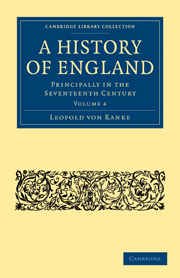Book contents
- Frontmatter
- Contents
- BOOK XVI THE LATER YEARS OF CHARLES II, 1675—1685 WHIGS AND TORIES
- INTRODUCTION
- CHAP. I Parliament in 1675. Formation of new parties
- CHAP. II The fourteen months' prorogation. Parliamentary Session of 1677
- CHAP. III Dynastic and political alliance of Charles II with the Prince of Orange
- CHAP. IV Complications at the conclusion of the Peace of Nimuegen. Alliance of Louis XIV with the Parliamentary opposition in England
- CHAP. V Denunciation of a Jesuit conspiracy. Last Session of the Parliament of the Restoration
- CHAP. VI Parliament of 1679
- CHAP. VII Parliamentary interim, 1679, 1680
- CHAP. VIII The Parliamentary Session of 1680
- CHAP. IX Parliament at Oxford, March 1680, 1681
- CHAP. X Antagonism of the Prince of Orange and the Duke of York
- CHAP. XI Reaction against the Whigs. Rye-House Plot. Execution of Lord William Russell
- CHAP. XII End of Charles II's Government
- BOOK XVII REIGN OF JAMES II, FEBRUARY 1685 TO SEPTEMBER 1688
- BOOK XVIII THE FALL OF JAMES II IN ITS CONNEXION WITH THE EUROPEAN CONFLICTS WHICH MARKED THE CLOSE OF 1688
- BOOK XIX COMPLETION OF THE REVOLUTION IN THE THREE KINGDOMS, 1688—1691
CHAP. V - Denunciation of a Jesuit conspiracy. Last Session of the Parliament of the Restoration
Published online by Cambridge University Press: 07 September 2011
- Frontmatter
- Contents
- BOOK XVI THE LATER YEARS OF CHARLES II, 1675—1685 WHIGS AND TORIES
- INTRODUCTION
- CHAP. I Parliament in 1675. Formation of new parties
- CHAP. II The fourteen months' prorogation. Parliamentary Session of 1677
- CHAP. III Dynastic and political alliance of Charles II with the Prince of Orange
- CHAP. IV Complications at the conclusion of the Peace of Nimuegen. Alliance of Louis XIV with the Parliamentary opposition in England
- CHAP. V Denunciation of a Jesuit conspiracy. Last Session of the Parliament of the Restoration
- CHAP. VI Parliament of 1679
- CHAP. VII Parliamentary interim, 1679, 1680
- CHAP. VIII The Parliamentary Session of 1680
- CHAP. IX Parliament at Oxford, March 1680, 1681
- CHAP. X Antagonism of the Prince of Orange and the Duke of York
- CHAP. XI Reaction against the Whigs. Rye-House Plot. Execution of Lord William Russell
- CHAP. XII End of Charles II's Government
- BOOK XVII REIGN OF JAMES II, FEBRUARY 1685 TO SEPTEMBER 1688
- BOOK XVIII THE FALL OF JAMES II IN ITS CONNEXION WITH THE EUROPEAN CONFLICTS WHICH MARKED THE CLOSE OF 1688
- BOOK XIX COMPLETION OF THE REVOLUTION IN THE THREE KINGDOMS, 1688—1691
Summary
One day in August 1678, Charles II was walking in St. James's Park, when an old acquaintance, by name Kirkby, approached, and warned him not to separate himself from his companions, for there was a plot against his life; he might easily be shot even on this walk. Being ordered to come to Whitehall in the evening to give fuller information, Kirkby brought with him a London clergyman of Puritan opinions, Israel Tonge by name, who gave the King detailed information about a Jesuit conspiracy, which was all the more credible as it came from a man who had just apostatised from the Order, Titus Oates. Tonge had written against the morality of the Jesuits; Oates affirmed that he had been commissioned to put him out of the way in consequence; but instead of killing him he had made friends with him. He was in possession of very offensive letters or extracts from letters. Tonge first showed him their object and their full bearing. In the information which Tonge communicated to the King, he was so far himself concerned, and anyhow it was well calculated to excite attention and anxiety.
These extracts were taken from the correspondence of English Jesuits, who lived in London, with members of the old Jesuit seminaries on the Continent, such as the Rector of St. Omer, the Procurator in Madrid and the Provincial in London: Oates had opened the letters which had been entrusted to him to deliver, and so had succeeded in gaining much additional information which he wrote down.
- Type
- Chapter
- Information
- A History of EnglandPrincipally in the Seventeenth Century, pp. 58 - 71Publisher: Cambridge University PressPrint publication year: 2010First published in: 1875



